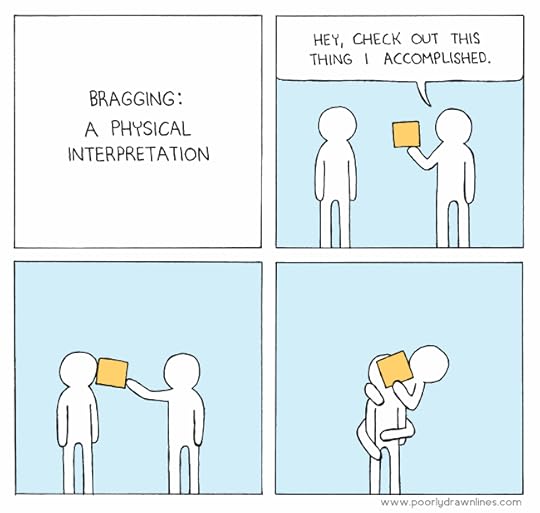What does Stack Overflow want to be when it grows up?
I sometimes get asked by regular people in the actual real world what it is that I do for a living, and here's my 15 second answer:
We built a sort of Wikipedia website for programmers to post questions and answers. It's called Stack Overflow.
As of last month, it's been 10 years since Joel Spolsky and I started Stack Overflow. I currently do other stuff now, and I have since 2012, but if I will be known for anything when I'm dead, clearly it is going to be good old Stack Overflow.
Here's where I'd normally segue into a bunch of rah-rah stuff about how great Stack Overflow is, and thus how implicitly great I am by association for being a founder, and all.
I do not care about any of that.
What I do care about, though, is whether Stack Overflow is useful to working programmers. Let's check in with one of my idols, John Carmack. How useful is Stack Overflow, from the perspective of what I consider to be one of the greatest living programmers?
@StackExchange @codinghorror SO has probably added billions of dollars of value to the world in increased programmer productivity.
— John Carmack (@ID_AA_Carmack) September 17, 2013
I won't lie, September 17th, 2013 was a pretty good day. I literally got chills when I read that, and not just because I always read the word "billions" in Carl Sagan's voice. It was also pleasantly the opposite of pretty much every other day I'm on Twitter, scrolling through an oppressive, endless litany of shared human suffering and people screaming at each other. Which reminds me, I should check my Twitter and see who else is wrong on the Internet today.
I am honored and humbled by the public utility that Stack Overflow has unlocked for a whole generation of programmers. But I didn't do that.
You did, when you contributed a well researched question to Stack Overflow.
You did, when you contributed a succinct and clear answer to Stack Overflow.
You did, when you edited a question or answer on Stack Overflow to make it better.
All those "fun size" units of Q&A collectively contributed by working programmers from all around the world ended up building a Creative Commons resource that truly rivals Wikipedia within our field. That's ... incredible, actually.
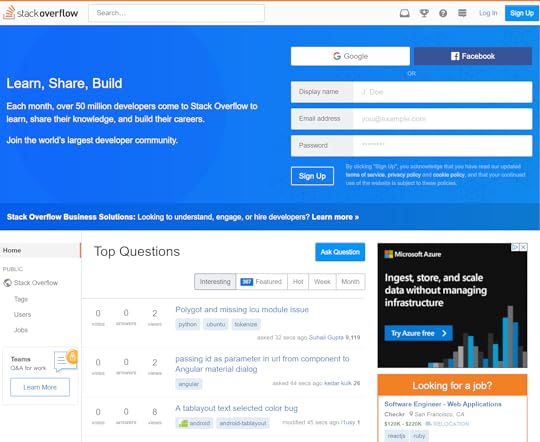
But success stories are boring. The world is filled with people that basically got lucky, and subsequently can't stop telling people how it was all of their hard work and moxie that made it happen. I find failure much more instructive, and when building a business and planning for the future, I take on the role of Abyss Domain Expert™ and begin a staring contest. It's just a little something I like to do, you know ... for me.
Thus, what I'd like to do right now is peer into that glorious abyss for a bit and introspect about the challenges I see facing Stack Overflow for the next 10 years. Before I begin, I do want to be absolutely crystal clear about a few things:
I have not worked at Stack Overflow in any capacity whatsoever since February 2012 and I've had zero day to day operational input since that date, more or less by choice. Do I have opinions about how things should be done? Uh, have you met me? Do I email people every now and then about said opinions? I might, but I honestly do try to keep it to an absolute minimum, and I think my email archive track record here is reasonable.
The people working at Stack are amazing and most of them (including much of the Stack Overflow community, while I'm at it) could articulate the mission better — and perhaps a tad less crankily — than I could by the time I left. Would I trust them with my life? No. But I'd trust them with Joel's life!
The whole point of the Stack Overflow exercise is that it's not beholden to me, or Joel, or any other Great Person. Stack Overflow works because it empowers regular everyday programmers all over the world, just like you, just like me. I guess in my mind it's akin to being a parent. The goal is for your children to eventually grow up to be sane, practicing adults who don't need (or, really, want) you to hang around any more.
Understand that you're reading the weak opinions strongly held the strong opinions weakly held of a co-founder who spent prodigious amounts of time working with the community in the first four years of Stack Overflow's life to shape the rules and norms of the site to fit their needs. These are merely my opinions. I like to think they are informed opinions, but that doesn't necessarily mean I can predict the future, or that I am even qualified to try. I've never let being "qualified" stop me from doing anything, and I ain't about to start tonight.
Stack Overflow is a wiki first
Stack Overflow ultimately has much more in common with Wikipedia than a discussion forum. By this I mean questions and answers on Stack Overflow are not primarily judged by their usefulness to a specific individual, but by how many other programmers that question or answer can potentially help over time. I tried as hard as I could to emphasize this relationship from launch day in 2008. Note who has top billing in this venn diagram.
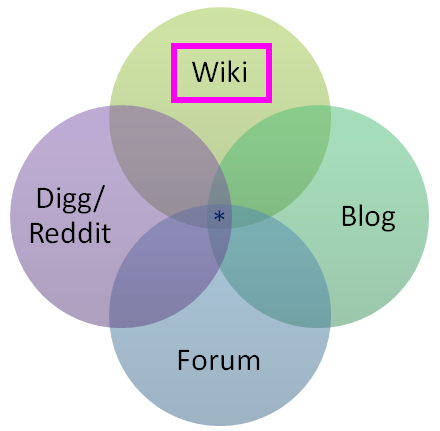
Stack Overflow later added a super neat feature to highlight this core value in user profiles, where it shows how many other people you have potentially helped with your contributed questions and answers so far.
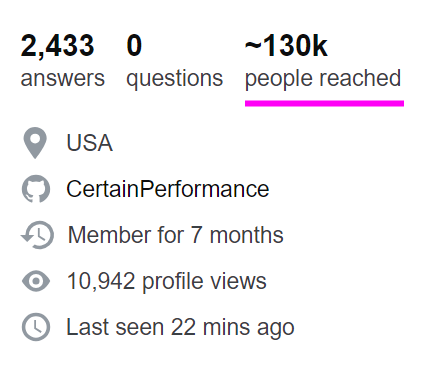
The most common complaints I see about Stack Overflow are usually the result of this fundamental misunderstanding about who the questions and answers on the site are ultimately for, and why there's so much strictness involved in the whole process.
I wish more people understood that the goal of Stack Overflow is not "answer my question" but "let's collaboratively build an artifact that will benefit future coders". Perhaps SO could be doing more to educate people about this.
— Jeff Atwood (@codinghorror) April 30, 2018
I'm continually amazed at the number of people, even on Hacker News today, who don't realize that every single question and answer is editable on Stack Overflow, even as a completely anonymous user who isn't logged in. Which makes sense, right, because Stack Overflow is a wiki, and that's how wikis work. Anyone can edit them. Go ahead, try it right now if you don't believe me — press the "improve this answer" or "improve this question" button on anything that can be improved, and make it so.
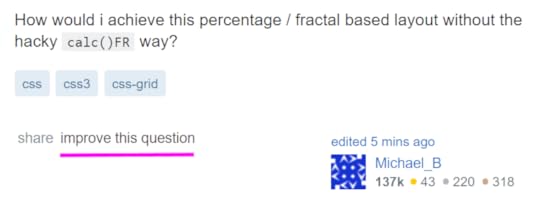
The responsibility for this misunderstanding is all on Stack Overflow (and by that also mean myself, at least up until 2012). I guess the logic is that "every programmer has surely seen, used, and understands Stack Overflow by now, 10 years in" but ... I think that's a risky assumption. New programmers are minted every second of every day. Complicating matters further, there are three tiers of usage at Stack Overflow, from biggest to smallest, in inverted pyramid style:
I passively search for programming answers.
Passively searching and reading highly ranked Stack Overflow answers as they appear in web search results is arguably the primary goal of Stack Overflow. If Stack Overflow is working like it's supposed to, 98% of programmers should get all the answers they need from reading search result pages and wouldn't need to ask or answer a single question in their entire careers. This is a good thing! Great, even!
I participate on Stack Overflow when I get stuck on a really hairy problem and searching isn't helping.
Participating only at those times when you are extra stuck is completely valid. However, I feel this level is where most people tend to run into difficulty on Stack Overflow, because it involves someone who may not be new to Stack Overflow per se, but is new to asking questions, and also at the precise time of stress and tension for them where they must get an answer due to a problem they're facing … and they don't have the time or inclination to deal with Stack Overflow's strict wiki type requirements for research effort, formatting, showing previous work, and referencing what they found in prior searches.
I participate on Stack Overflow for professional development.
At this level you're talking about experienced Stack Overflow users who have contributed many answers and thus have a pretty good idea of what makes a great question, the kind they'd want to answer themselves. As a result, they don't tend to ask many questions because they self-medicate through exhaustive searching and research, but when they do ask one, their questions are exemplary.
(There's technically a fourth tier here, for people who want to selflessly contribute creative commons questions and answers to move the entire field of software development forward for the next generation of software developers. But who has time for saints
Jeff Atwood's Blog
- Jeff Atwood's profile
- 34 followers


